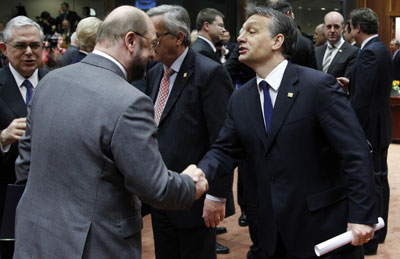The state of press freedom inside the European Union has a significant effect on press freedom outside the EU. That was the message that CPJ Senior European Adviser Jean-Paul Marthoz and I delivered this week when Brussels’ leading think tank, the European Policy Center (EPC), hosted us for a policy dialogue marking the launch of our annual survey, Attacks on the Press.
The discussion — which featured Anthony Whelan, head of cabinet for European Commission Vice President Neelie Kroes, and was moderated by Fabian Zuleeg, chief economist at the EPC — centered on the effect that Europe’s domestic media policies have on press freedom beyond its borders, and the importance of the EU’s determination to hold member states to the bloc’s fundamental values.
The case of Hungary was again at the debate’s forefront, with CPJ calling on Commissioner Kroes, who is responsible for the EU Digital Agenda, to push more decisively for Budapest to reform its restrictive media law.
Since the law came into effect in January 2011, it has garnered criticism both at home and abroad for introducing vague requirements of “balanced coverage” and imposing penalties for content deemed “insulting” to vaguely described communities or for material incompatible with broad ideas such as “human dignity” and “public morality.” The interpretation and implementation of these and other restrictive provisions of the law were placed solely in the hands of the newly created National Media and Infocommunications Authority — a bureaucracy endowed with vast powers and staffed by parliamentary appointees serving renewable nine-year terms. As Hungary’s parliament is dominated by the ruling party, Fidesz, the law effectively granted the party the power to control news media.
The law — flabbergasting in any context — drew even more outrage because it was adopted while Hungary held EU’s rotating presidency. Rightfully, Budapest was accosted by a barrage of critics, including CPJ, who warned of the damage such legislation would have on domestic media as well as of the harmful precedent it set in Europe and beyond.
The European Commission — the institution tasked with monitoring compliance with EU directives — was expected to act decisively and demand that Hungary reform the law fundamentally but, instead, the Commission insisted only on technical changes that did not result in the law’s alignment with the core EU values enshrined in the Treaty of Lisbon and the Charter of Fundamental Rights. Recently, Commissioner Kroes, who has led the Commission’s efforts on Hungary, has pushed for more substantive changes. On Wednesday, CPJ encouraged those efforts and warned of the consequences of any failure to follow through.
“The EU is excessively inward-looking and forgets that allowing to some extent a free pass for its member states not only weakens its ambition to be a beacon for democracy and human rights abroad but also provides authoritarian states with an alibi to adopt flawed policies,” Marthoz told a diverse audience of journalists, academics, and policy makers.
The CPJ-European Commission dialogue took place a day after a hearing at the European Parliament focused on the impact of the Hungary media law, which Marthoz and I attended along with CPJ Executive Director Joel Simon. The hearing featured Gyorgy Bolgar, senior editor and talk show host at Hungary’s popular Klubradio, which recently lost its broadcasting license after a tender apparently designed to take it off the air. Bolgar spoke candidly of the restrictive powers of the media authority as set up by the new media law. Although Klubradio is still on the air while appealing the loss of its license, Bolgar is not optimistic.
In Brussels, CPJ met with Tanja Fajon, vice president of the European Parliament’s intergroup on the media, as well as with Marietje Schaake, a member of the European Parliament and author of the Internet Freedom Forum bill, presented them with a copy of our annual report and discussed press freedom issues in the EU and beyond its borders.
In a meeting with Helene Flautre, chair of the European Parliament-Turkey delegation, CPJ expressed concern at the deteriorating press freedom climate in Turkey, culminating in the mass jailing of journalists and media workers, dozens of whom have been held in custody without due process on grave charges of terrorism and anti-state activity. The meeting took place on the heels of a CPJ fact-finding trip to Istanbul, where Joel Simon and I met with Turkish journalists and media rights groups in preparation for a thorough research report that will look at the individual cases of the imprisoned journalists in the broad context of media freedom.
CPJ urged the EU to use the opportunity provided by accession negotiations to urge Turkey to reform its legislation fundamentally, by removing broadly worded anti-terror and anti-state provisions that are used against journalists who cover sensitive issues and by eliminating prolonged pretrial detention as a penalty measure.
CPJ also called on EU member-states to work with the European Broadcasting Union — which is in charge of supervising the popular Eurovision Song Contest, an event that will bring participants from over 40 counties to Baku this May — to hold Azerbaijan to its commitments on press freedom as a member of the Council of Europe. In the run-up to Eurovision, CPJ told the EPC audience, Azerbaijan continues to harass, jail, and obstruct the work of independent, pro-opposition, and international journalists. At the same time, it fails to investigate physical attacks against the press, including the murder seven years ago of prominent editor Elmar Huseynov.
“European Union media policies have an impact not only on its members but also on its neighbors,” I told the EPC audience on Wednesday. “That impact may be either positive or harmful, depending on the EU’s action or failure to act. And that endows the EU with big responsibility.”
(Reporting from Brussels)
